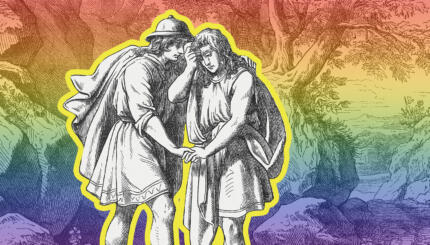Commentary on Parashat Metzora, Leviticus 14:1 - 15:33
I remember the first time I learned about lashon hara (derogatory speech about others that is prohibited under Jewish law). I was a little girl sitting in the synagogue we belonged to, and my rabbi explained that once you squirt out all of the toothpaste from its tube, you cannot put it back in. He said that just like the toothpaste, the words that come out of our mouths cannot be taken back. And so, I learned the lesson that every child is taught, whether directly or indirectly: What we say matters.
In Parashat Metzora, we read about what I will call the “toothpaste sacrifice.” During the time when the Temple stood in Jerusalem, this sacrifice was offered because a person spoke derogatory words about another and as a result contracted a spiritual malady: a skin disease called tzaraat (the person with tzaraat was known as the metzora). According to our Sages, God afflicted those who had engaged in lashon hara. The sacrifice to begin the healing from tzaraat and to atone for lashon hara looked like this: “Two live, clean birds, a cedar stick, and a strip of crimson wool, and hyssop.” (Leviticus 14:4)
Rashi, the 11th-century biblical commentator, breaks down the significance of each of these elements (Rashi on Leviticus 14:4). Drawing from the Midrash and the Gemara (our Oral Tradition), he explains that birds are sacrificed in response because they constantly twitter and chirp, creating sounds like the chatter of lashon hara. Cedar stick is used because cedar trees stand tall, symbolizing haughtiness and ego, which often fuel our judgmental and hurtful speech. The crimson wool looks like a tongue, which is the physical God-given tool through which we speak, sometimes for good and sometimes for bad. And the unassuming hyssop plant represents the need for humility in the elimination of haughtiness.
With this explanation, we see our “toothpaste sacrifice” transform from a distant practice of the past to relatable advice for the present. We may not be able to put the toothpaste back into the tube and take back the destructive things we have said, but God has given us a path to a different form of healing and repair. It is key that this Divine path is not external but instead profoundly internal. An apology, though necessary, is not sufficient.
With your help, My Jewish Learning can provide endless opportunities for learning, connection and discovery.
The person who has spoken lashon hara and now has tzaraat must also separate from the chirping and chatter — the outside influences that drown out goodness and amplify dissonance. He or she must identify the haughtiness and ego within, the proverbial cedar tree inside each of us. And then the person must do the hard work of cultivating humility. This means humility between humans and God, as illustrated in the appreciation that the tongue ultimately belongs to God and should be used in Godly ways. And this also means humility between people, as we each strive to treat each other with the humbleness and flexibility of the hyssop.


